



October 2008
The basics of quality improvement
I recently donned scrubs and helped a team organize a messy surgical storeroom at Emory University Hospital. Why? Because Emory’s commitment to quality improvement requires an understanding of the process and involvement at every level. We found it would take someone more than 13 minutes to retrieve three surgical supplies in that jumble, including the time it took to locate a person to help find what was needed.
This small exercise is part of a system wide push for quality improvement—a push with a simple name, the “LEAN” process. LEAN (not an acronym) is simply a philosophy of doing business adapted from Toyota’s production system that eliminates waste, defined as any process or process step that does not add value to the product. “In health care, approximately 85% of what happens in the process of delivering care is of no value to the patient,” says Robert Keown, Senior Quality Project Manager for Emory Healthcare. “It’s our job to analyze the process and eliminate the often redundant and unnecessary steps that do not contribute to diagnosis, treatment, and outcome. The goal is to make all of our processes more predictable and reliable, support optimal outcomes for our patients, and eliminate unacceptable delays.”
I encourage you along in this process. You can learn more about LEAN during a two-day course, Leadership for Healthcare Improvement, offered by the Office for Quality. In October, it will offer another four-month course for employees who lead day-to-day quality improvement activities. The office also will launch a new website with information in a few weeks, and the LEAN program will be integrated into the new medical curriculum.
So, what was the result of my first-hand experience with LEAN? By labeling and organizing equipment, throwing out unnecessary or obsolete items, and sending unwanted supplies to places that could use them, our post-test showed it took 4.5 minutes to retrieve the same three supplies. An assigned team of OR staff now conducts regular audits of the storeroom to make sure it stays organized. As a member of my crew, Arnold Barros, Director of the hospital’s Anesthesia Services, pointed out, “Our goal was to make surgical supplies readily available so that physicians can focus on research instead of wondering where the supplies are and when they might show up.”
TOP
New Dermatology Chair
 Robert Swerlick recently was named the new Chair of the Department of Dermatology. He was appointed as Interim Chair last April as Dr. Wright Caughman left the post to become Vice President for Clinical and Academic Integration in the Woodruff Health Sciences Center.
Robert Swerlick recently was named the new Chair of the Department of Dermatology. He was appointed as Interim Chair last April as Dr. Wright Caughman left the post to become Vice President for Clinical and Academic Integration in the Woodruff Health Sciences Center.
Swerlick came to Emory two decades ago from the NIH where he worked as a medical staff fellow in the Dermatology Branch of the NCI. His leadership skills are well known; he served on the SOM’s Professional Services Committee, as Core Director of the Emory Skin Diseases Research Center, as past-President of the Southern Society for Investigative Dermatology, and as President of the Georgia Society of Dermatologists.long with our farewells to the Class of 2008 come our good wishes for the next stage of their medical careers: residency. Of the 112 graduating students, 108 participated in the National Residency Match Program. Nineteen will spend all or part of their residencies at Emory, joining 177 students from other medical schools.
TOP
New leadership in liver transplant
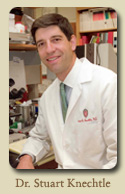 Stuart Knechtle has joined Emory as Director of the Liver Transplant Program. Formerly, he directed liver transplantation and transplant clinical trials at the University of Wisconsin.
Stuart Knechtle has joined Emory as Director of the Liver Transplant Program. Formerly, he directed liver transplantation and transplant clinical trials at the University of Wisconsin.
He led a team that performed Wisconsin’s first living-donor liver transplant and the state’s first combined liver/pancreas transplant. His research, in human clinical trials and in non-human primate models, focuses on immune tolerance.
Knechtle received his medical degree from Cornell University Medical College. He was a surgery resident and research fellow in transplant immunology at Duke University and a transplant fellow at the University of Wisconsin.
He is on the editorial board of several national academic journals, including Transplantation, Transplant Immunology, and Annals of Surgery, and is co-editor-in-chief of Transplantation Reviews. In 1999, Knechtle founded Renovar, a biotech company specializing in diagnostic tests for kidney disease.
TOP
New faces in medicine
A warm welcome to the class of 2012. As a testament to the high quality of our expanding medical program, enrollment is up for the second year in a row. Of the 132 students in the M1 class, 70 are women and 62 are men. Their average age is 23, and the average cumulative MCAT score is 34. Twelve are part of the MD/PhD program and 17 are part of the MD/MPH program. A number already have advanced degrees. Two of the entering students have received DDS degrees, while three have MPHs and two have PhDs in biomedical engineering. This year’s class includes 13 from Emory, 16 from the University of Georgia, eight from Ga. Tech, and six each from Duke, Yale, and University of Pennsylvania.
TOP
Update from Grady
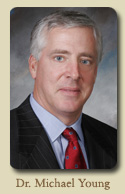 Michael Young has joined the Grady Health System as its president and chief executive officer. Young was the CEO of Erie County Medical Center in Buffalo, NY, a smaller public hospital than Grady but one that has faced its own set of financial woes. He helped turn around a $30 million operating deficit at Erie into a surplus in about three years.
Michael Young has joined the Grady Health System as its president and chief executive officer. Young was the CEO of Erie County Medical Center in Buffalo, NY, a smaller public hospital than Grady but one that has faced its own set of financial woes. He helped turn around a $30 million operating deficit at Erie into a surplus in about three years.
Grady approved a new lease and transfer agreement for a new nonprofit corporation to oversee its governance and financial turnaround earlier this year. Dr. John Maupin, President of the Morehouse School of Medicine, and I serve as ex-officio members of the corporation’s board.
In May, the Woodruff Foundation awarded Grady the first $50 million installment of its $200 million grant, which will be allocated over four years. One of Grady’s first purchases from the grant was to replace the hospital’s 16-year-old beds with new “talking” beds. The beds have commands programmed in 14 languages, the ability to weigh a patient, and an alarm that sounds if a patient falls off the bed.
TOP
Joel Salz joins Woodruff Health Sciences
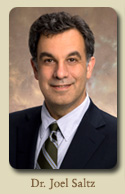 Joel Saltz joins the WHSC this month as Director, Center for Comprehensive Informatics. In this new role, he'll help plan a new joint Emory-Georgia Tech Department of Biomedical Informatics and will develop initiatives to analyze data generated from research and translate that information into knowledge necessary to develop medical innovations. He also will direct strategic planning and implementation of the comprehensive Medical Information Enterprise.
Joel Saltz joins the WHSC this month as Director, Center for Comprehensive Informatics. In this new role, he'll help plan a new joint Emory-Georgia Tech Department of Biomedical Informatics and will develop initiatives to analyze data generated from research and translate that information into knowledge necessary to develop medical innovations. He also will direct strategic planning and implementation of the comprehensive Medical Information Enterprise.
Saltz joins Emory from Ohio State University, where he served as Chair and Professor, Department of Computer Science and Engineering.He received his MD and PhD degrees in computer science from Duke University. He is a board-certified clinical pathologist.
TOP
SOM appoints Dr. Carlton Dampier
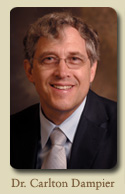 The SOM has appointed sickle cell expert Carlton Dampier (Pediatrics) as Director of the Office for Clinical Research, Professor of Pediatrics, and Assistant Dean for Clinical Research. He will direct the Ethics, Regulatory Knowledge, and Support program as a member of the Atlanta Clinical and Translational Science Institute and help expand Emory’s
The SOM has appointed sickle cell expert Carlton Dampier (Pediatrics) as Director of the Office for Clinical Research, Professor of Pediatrics, and Assistant Dean for Clinical Research. He will direct the Ethics, Regulatory Knowledge, and Support program as a member of the Atlanta Clinical and Translational Science Institute and help expand Emory’s
clinical trials enterprise and partnerships.
Dampier comes to Emory from Drexel UniversityCollege of Medicine, where he was Associate Chair for Research and Medical Director, Marian Anderson Sickle Cell Anemia Care and Research Center.
TOP
SOM friend dies in June
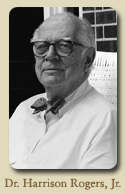 Harrison Rogers, Jr., 48C, 52M, an Assistant Clinical Professor, Board of Visitors member, and physician appointee to the Fulton County Board of Health, passed away on June 21. He practiced general surgery for more than 40 years in Atlanta and was very active in the community throughout his career and retirement years. He served as medical director to several major projects at the Georgia Hospital Association, Past-President of the American Medical Association, and former Speaker and Vice-Speaker of the Medical Association of Georgia’s House of Delegates and a member of its Board of Trustees. A friend to the SOM for more than 50 years, he received a Medical Alumni Association Award of Honor in 1983 and an honorary Doctor of Science Degree from the university in 1986. He was a long-serving member of the School of Medicine’s Board of Advisors.
Harrison Rogers, Jr., 48C, 52M, an Assistant Clinical Professor, Board of Visitors member, and physician appointee to the Fulton County Board of Health, passed away on June 21. He practiced general surgery for more than 40 years in Atlanta and was very active in the community throughout his career and retirement years. He served as medical director to several major projects at the Georgia Hospital Association, Past-President of the American Medical Association, and former Speaker and Vice-Speaker of the Medical Association of Georgia’s House of Delegates and a member of its Board of Trustees. A friend to the SOM for more than 50 years, he received a Medical Alumni Association Award of Honor in 1983 and an honorary Doctor of Science Degree from the university in 1986. He was a long-serving member of the School of Medicine’s Board of Advisors.
Thomas J. Lawley, MD
Dean, Emory School of Medicine
TOP
Current Issue • Past Issues • SOM Home
Contact Us • Give a Gift
Copyright © Emory University, 2008. All Rights Reserved